| Reviews & Columns |
|
Reviews DVD TV on DVD Blu-ray 4K UHD International DVDs In Theaters Reviews by Studio Video Games Features Collector Series DVDs Easter Egg Database Interviews DVD Talk Radio Feature Articles Columns Anime Talk DVD Savant Horror DVDs The M.O.D. Squad Art House HD Talk Silent DVD
|
DVD Talk Forum |
|
|
| Resources |
|
DVD Price Search Customer Service #'s RCE Info Links |
|
Columns
|
|
|
Katharine Hepburn 100th Anniversary Collection
THE MOVIES:
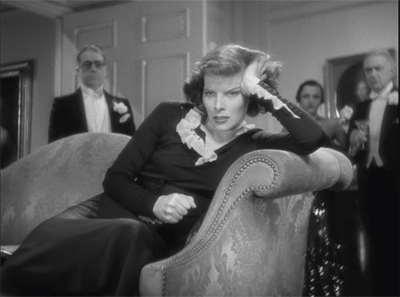
Katharine Hepburn is one of those rare individuals who can truly be said to have come from a different time. Yes, many historical figures are reflections of the particular social mores of their era, but it's something else altogether to be one of those figures that is so unique, there is no way to repeat the confluence of factors that made them. Surely, Hollywood couldn't come up with a movie star like her today. The way we view our celebrities has changed too much. The Golden Age of American cinema produced icons whose images were a mixture of their own personal quirks and studio spin. One gets the sense that one knows stars like Cary Grant and Humphrey Bogart from watching their films, but at the same time, the flickering lights of motion pictures allows them to maintain a sense of mystery. For as personal as our connection to them, they have a sense of "otherness" that can never be fully erased. They are one of us, and yet they are something more.
Of the classic female stars, no one may embody this as much as Katharine Hepburn. The accent, the laugh, the strident intelligence, the incredible strength and the equally incredible fragility it keeps in check. She had parts in over fifty movies from 1932 to 1994, establishing one of the greatest legacies in American movies. Though she had her fair share of trouble spots, she always managed to pull out of them, and her pairings with the aforementioned Mr. Grant and the love of her life, Spencer Tracy, resulted in some of the best films ever made. Out of twelve Oscar nominations as Best Actess, she won four. Not bad, eh?
This new boxed set, the Katharine Hepburn 100th Anniversay Collection, features six movies not previously available on DVD. Put together to celebrate the centennial of her birth, it runs across the full course of her career, starting with her third feature, 1933's Morning Glory, her first Oscar-winning role, and ending with 1979's The Corn is Green, the last of her fruitful and long-term collaboration with director George Cukor.
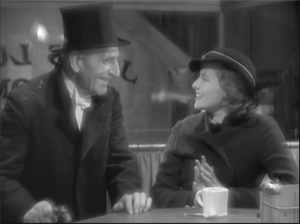
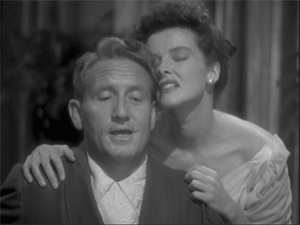
left to right: Morning Glory; Without Love
Morning Glory (DVD 1: 1933, 76 minutes) was directed by Lowell Sherman (She Done Him Wrong) and adapted by Howard J. Green (I Was a Fugitive from a Chain Gang) from a play by Zoe Akins (The Greeks Had a Word For It, a.k.a. How to Marry a Millionaire). It features the young actress, appropriately enough, in the role of a young actress, the hopelessly naive but fiercely determined Eva Lovelace (a stage name, as she's quick to point out--do you like it?). Eva has come to New York City from her home in Vermont to try to make her way treading the boards. Walking into the office of Louis Easton (Adolphe Menjou), one of the most successful producers on Broadway, she talks a blue streak that makes her seem alternately crazy, endearing, or inspiring, depending on who you ask. The other actresses think she's pathetic, but the men around are caught in her spell, particularly the writer Joseph Sheridan (Douglas Fairbanks Jr.).
What transpires is a slightly skewed take on the rags to riches rise of a Broadway star. While the title, Morning Glory, refers to the glow of overnight success, it might also refer to the post-coital glow, the dirty curve Easton throws Eva that could only be talked about in a roundabout fashion in the 1930s. Given Eva's precarious mental state, the situation takes on a decidedly dark pallor, and so it's strange when Easton's cruelty is fairly easily bypassed in the climax. In fact, the whole movie has a kind of strangeness about it. It suffers from a staginess that deadened a lot of pictures from the period, making it all the more discomfiting that Fairbanks performs in a loose, naturalistic style that feels out of place next to his colleagues' more demonstrative approach. There is also a jumbled sense of time in the narrative. Part of it is intentional, since at least one character makes a point of how Eva speaks of weeks as if they were years, but it's an incongruity that eventually affects the timeline of the entire script, making it difficult to gauge just how much time has passed by the end.
Really, without Katharine Hepburn, we'd probably not even still be viewing Morning Glory today. Her take on Eva suggests more than a passing knowledge of obsessive-compulsive psychoses. When Eva starts on one of her talking jags, Hepburn freight-trains through it, barely breathing but still hitting the right marks, shifting into the various tangents as if they were the most logical choices for where to go next. The speeches are revelatory, not just as pieces of great acting, but for the character, revealing her vulnerability, her intelligence, and the power of her singular belief. It's the most complicated kind of denial, as Eva believes her own rationalizations even as she betrays them by calling them false. Hepburn never rings a bum note. She's just splendid.
DVD 2 takes us twelve years forward to 1945 and Harold S. Bucquet's Without Love (110 min>). By this point, the Katharine Hepburn persona was pretty well-established, and her romantic comedies were becoming a staple of cinemas. It was her third movie with Spencer Tracy, a most winning combination and perennial exception to the rule that off-screen chemistry is supposed to yield on-screen fizzles. In fact, a kind of repertory had gathered around Hepburn in the intervening years. The screenplay for Without Love was adapted by Donald Ogden Stewart, who had also written the scripts for Holiday and The Philadelphia Story, and all three movies were taken from stage plays by Philip Barry.
The deliciously improbable plot casts Tracy as scientist Patrick Jamieson, a citizen contributing to the wartime effort by secretly working on a high-altitude oxygen mask for pilots in the U.S. army. A chance meeting leads him to the basement in the house of Jamie Rowan (Hepburn), a wealthy widow whose personal loss has made her never want to love again. Pat is of the same mind, but for the opposite reason. Rather than having experienced the greatest love of his life, he's experienced the greatest frustration--a French socialite who keeps him dangling by a heartstring. Another thing the pair has in common is that their late fathers were both scientists, and so they share a hunger for knowledge and discovery. Seeing the perfect opportunity for a coupling, they decide to get married. It will be a union of convenience, built on true friendship without any of that troublesome love stuff mucking up the works.
It wouldn't be a Tracy/Hepburn picture, of course, if this plan didn't go horribly awry. Two people so perfect for each other will perfectly fall in love. Not without their obstacles, of course. Jamie will have to get over hang-ups, and Pat will have to finally let go of his French pastry. Comedy ensues along the way, including gleefully silly montages of the two at work in Pat's lab. There is also some funny business involving Pat's sleepwalking and the little dog he's trained to stop him from wandering too far. Running parallel to the action is another comic couple, played by a young Lucille Ball and Keenan Wynn (Royal Wedding). It's nearly a case of the supporting cast running away with the show. Though Ball is more restrained than we'd come to know from her, I've never seen Wynn be funnier. He's marvelous as the perpetually drunken Quentin, equal parts clown and cad.
As a Tracy/Hepburn fan new to Without Love (in fact, I hadn't seen any of the movies in the box before this viewing), the film fits right in with what I like about the acting duo's comedies. Hepburn's character is never any less than her partner's equal, which is not always the case in 1940s romantic comedies. She is always smart and active in her own power, and her specialness is never neutralized. Rather, both lovers usually have to move either up or down to find a common ground that will allow them to be together. For me, what sets Without Love apart from the rest of their team-ups is the final scene, where Jamie and Pat admit their love without ever admitting it out and out. They do a little verbal dance, saying what they feel in a roundabout way. It's both clever and smart, and the two actors come off as remarkably sincere while still keeping it light. (In reality, they weren't stepping too far outside themselves, as they had years of a very public private affair.) Their last embrace is surprisingly sensual. Hepburn looks particularly hungry, like she's just about to bite a chunk of flesh from Tracy's head. It's enough to inspire the vapors.
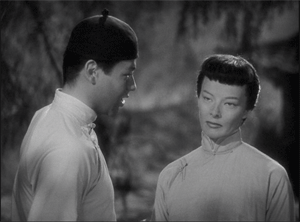
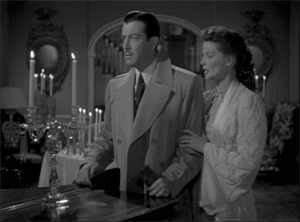
Dragon Seed; Undercurrent
Harold S. Bucquet also directed Hepburn the year before in his movie Dragon Seed (DVD 3: 1944, 148 min.). Bucquet took over the production from an ailing Jack Conway, and the script was adapted from a novel by Pearl S. Buck (The Good Earth). The less said about this film, the better. Katharine Hepburn, Walter Huston, and other credible white actors are made-up to look like Chinese people, and the result is as egregious as the concept. The dialogue consists of fortune cookie-like aphorisms delivered in a stilted manner. All except for Akim Tamiroff, who speaks in an Armenian accent! Hepburn walks through the movie with the posture of a praying mantis, and her eyes keep moving, as if they can't believe the new shape the make-up person has given to them and their owner is self-conscious that someone might see her in this ridiculous get-up.
The story is set during the Japanese invasion of China in the late 1930s, and in effect is about the way this event tears a farming family apart. It's not difficult, however, to read between the lines and see the anti-Japanese propaganda lurking there. The Chinese are drawn as a peaceful people who love the land and care for their families, whereas the Japanese are violent marauders bombing innocent villages. I'm not a history scholar and don't have the knowledge to debate historical accuracy here, but regardless of how true Dragon Seed may or may not be, I would guess anti-Japanese sentiment stemming from World War II had a lot to do with this movie getting made.
In fact, if any movie in this set were begging for some special features, Dragon Seed would be it. There is plenty to be discussed--the cultural climate that allowed white actors to play Chinese, a historical context of racial portrayals on stage and in film, even a profile of Buck would have been nice. It seems like a movie the studio wouldn't really want to release without commenting on it. While there are far worse offenders out there, it's hard to watch Dragon Seed and not feel uneasy about it. I found it impossible to ignore how wrong it all looked enough to try and appreciate the story. The one standout scene, Henry Travers' amusing speech about the backwards land on the opposite side of the world, could have easily been extended to include the wrong-way-round policies of the motion picture industry.
Cooler, smarter heads would prevail by 1946, when Katharine Hepburn would make Undercurrent (DVD 4: 116 mins.), a tense thriller that stands out as another kind of oddity in her career. Undercurrent was actually kind of a departure for several of the people involved. Director Vincente Minnelli was known for his frothy musicals like Meet Me in St. Louis, and co-star Robert Mitchum was usually the tough guy, not the more sensitive soul he is here.
Hepburn is cast as Anne, the daughter of a widower scientist (Edmund Gwenn). Her father is about to sell his greatest discovery to Alan Garroway (Robert Taylor), a famous industrialist who invented a revolutionary navigation system for airplanes. Though Anne is convinced she will live the life of a spinster, when she and Alan meet, it's love at first sight. They are quickly married, and Anne is removed from her safe, academic world and placed amongst Washington politicos. She takes well to high society, but always feels out of step. Part of the problem is that her husband seems to be hiding something. The circumstances of his mother's death and the disappearance of his brother Michael (Mitchum) are closely guarded, and Alan loses his temper at the mere thought of them. Too many coincidences and almost psychic feelings keep bringing Michael to the fore, however, and Anne is convinced she must find out the truth if she's ever to know her spouse.
Undercurrent has started to pick up a bit of a reputation as a film noir. I first heard of the film last year when it played as part of a noir festival at the Northwest Film Center. I'm not really sure it qualifies, however, unless we can establish a subgenre of women's noir. The plot has more in common with Victorian melodramas like Wuthering Heights and the work of Daphne Du Maurier (and her frequent adapter Alfred Hitchcock) than it does the moody expressionism of Fritz Lang or Jules Dassin. Genre hair-splitting aside, however, I found Undercurrent to be absolutely riveting. Minnelli creates a palpable sense of foreboding that lingers over the picture, ratcheting up the suspense each time Anne finds something new to cause her to doubt her husband's story only to be placated by his wily explanations. You just know that eventually one of these things is going to be too large for him to erase, and then Anne is going to be in real trouble.
It's rare to see Katharine Hepburn portray a character that is as lost and confused as Anne. Normally, her characters are merely misguided, blinded by their own hubris or stubbornness. She's quite good in this sudsier role, enough to make me wish she had made more genre pictures. Minnelli also shows a great facility for the style, using what he learned about using his environment from shooting more pastoral pictures to give the couple's ranch a sinister bend.
I'd say my only complaint about Undercurrent is that Robert Mitchum is barely in it. Like Harry Lime in The Third Man, Michael Garroway is more of a pervading presence than he is an active participant. When he does show up, it has a much weightier impact. So, this isn't really a fault in the story. I just really like Robert Mitchum.
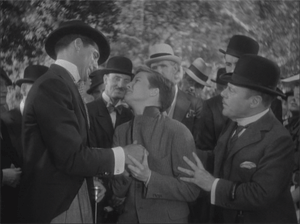
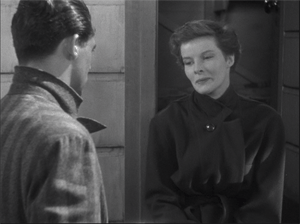
Sylvia Scarlett
Katharine Hepburn made ten movies under the direction of George Cukor. He cast her in her first film, Bill of Divorcement, in 1932. They paired for the last time forty-seven years later in The Corn is Green (DVD 6: 1979, 93 mins.), a television production of a play by Emlyn Williams. Hepburn was 72, Cukor was 80.
The Corn is Green is the story of Lilly Moffat (Hepburn), a never-married British woman who has inherited a Welsh estate from a departed family member. She arrives in the small mining town with a mission: educating its children. Much to the chagrin of the greedy and out-of-touch town squire (Bill Fraser), she establishes a school and begins to lure the youngsters away from the near-slave labor in his deep, dark pits. One of the older students, Morgan Evans (Ian Saynor), displays a rather keen mind for learning, and Lilly takes the young man under her wing to give him her full education. Ultimately, the goal is to get him a scholarship at Oxford, but there are many bumps along the way, including the townspeople's ridicule of Morgan's ambitions, an ill-timed indiscretion, and Lilly's own tunnel vision and stubbornness.
The Corn is Green is well-written and well-acted, but it's a tad bloodless. We've seen countless dramas like this on PBS and as part of the Hallmark series of movies on network TV. Even when dealing with rather heavy issues, the movie stands at a distance and never confronts them head-on. Neither is Lilly ever fully taken to task for her myopia. When Morgan explodes at her for never taking what he wants into consideration, he's got a pretty good point. Lilly's subsequent steamrollering over him proves him right, too.
Not a bad showing for two mega talents late in their careers, but a little too safe to have a lasting impact when faced with the grandeur that had come before.
Such as Sylvia Scarlett (DVD 5: 1935, 94 mins.). This film has a bit of a checkered reputation, having been a much derided flop on its initial release, leading to Hepburn being labeled "box office poison." Though Cary Grant would emerge from it having proven his skills as a romantic funnyman, it would take years for the movie itself to get a proper reassessment. (In the Cukor documentary on the double-disc Philadelphia Story, the director comments that it had become a cult hit and a favorite whenever a retrospective of his career was put together.)
Having finally seen Sylvia Scarlett, I can kind of see why the original audience didn't know what to make of it. It's definitely off-kilter, and it may run a little long, particularly in its screwball turn in the final fifteen minutes. Other than that, though, I found it enchanting.
Hepburn is Sylvia, a dour French-English girl who has just lost her mother. Adding insult to injury, her father (Gwenn again) has gotten into trouble from gambling, and the only cash they have to fund an escape is intended for Sylvia's dowry. Believing she'll never be married anyway, Sylvia cooks up a plan for them to escape to England. Fearing the police will be looking for a father/daughter duo, Sylvia decides to dress as a boy to throw the cops off their scent. The newly dubbed Sylvester takes exceedingly well to his new gender, so much so that his moxy impresses a slick Cockney conman by the name of Jimmy Monkley (Grant). He forms a criminal trio with the Scarletts, igniting Sylvester's sense of adventure. His sense of right and wrong won't let him keep stealing, though, so the three then team up with a chambermaid (Dennie Moore) and become traveling clowns.
And that's just the first half. Cukor packs a lot of story into Sylvia Scarlett. It's more than just a simple cross-dressing-for-comedy picture, however. Sylvia becoming a boy is actually a clever device employed by the writers to show how naïve the character really is. Hepburn is credible as a boy, and so she manages a convincing, athletic performance of a girl pretending to be one. It's almost like some weird version of method acting.
The second half of the film is concerned with the romantic entanglements that come out of this arrangement. Papa Scarlett chases the maid, Monkley's affection toward Sylvia after she reveals the truth is never clear, and Sylvia falls for a rakish artist (Brian Aherne, The Best of Everything) who exposes just how unprepared for womanhood Sylvia really is. A female once more, she's has few defenses to protect herself from his cad-like behavior and the emotional games his girlfriend (Natalie Paley) likes to play. Being a boy was easier for her, because the disguise allowed Sylvester to keep the world at arm's length. The revelation of Sylvia's true sex uncorks everything. Tragedy strikes, and the film's cynical heart is exposed, as well. This is perhaps what makes the final scenes of Sylvia Scarlett a little unconvincing: Sylvia and Monkley have already told us not to believe it.
Even so, it's not enough to fell the movie. The charms of the rest of the film hold strong. Cary Grant is smart and funny, and when you stop and think about it, Sylvia's predicament is really the Katharine Hepburn image taken to the extreme. A woman fights so hard for her liberation, she neglects the things about herself that are honest and warm, and the lesson she must learn is to somehow have both. It didn't matter how many times we watched Katharine Hepburn go through it, she held us in her thrall. It didn't matter if the material let her down, because she'd always pick the script right back up.
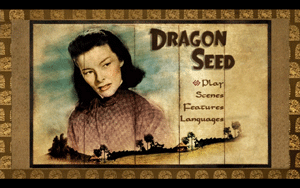
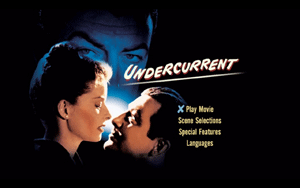
THE DVD
Video/Sound:
All of the films in the Katharine Hepburn 100th Anniversary Collection are shown in a full frame aspect ratio (1.33:1) and have a mono sound mix--except for The Corn is Green, which is in a matted widescreen format. It's also the only movie here that was shot in color. The majority of the movies are given a fairly decent restoration, cleaning up most of the dirt and scratches and achieving good resolution and a strong balance in the black-and-white photography. Undercurrent sometimes looked kind of soft, the background details getting fuzzy, and Sylvia Scarlett is a little grainy, but otherwise the films have been well-tuned.
The one obvious exception is the oldest film, Morning Glory. There are lots of spots, lines, and dirt on the image, as well as some flickering and even a couple of skips in the picture. Some audio is indistinct, but it sounds like that might have been just the downside of early recording devices and actors unfamiliar with microphones. They sound like they swallow the lines.
The movies also have French and English subtitles, while The Corn is Green has Portuguese, as well.
Extras:
There are no film-specific extras on any of these discs, but the first five DVDs have a short live action film and a vintage Warner Bros. or MGM cartoon. The quality of these extras vary, both in terms of enjoyment while watching them and audio/visual. The idea is that these would have shown before the main features had you seen them in their initial theatrical runs. The live action movies run anywhere between 8 and 20 minutes, and the cartoons are usually around 6 or 7. The rundown of these extras is as follows (cartoon listed first, live action second):
* Morning Glory: "Bosko's Mechanical Man" and "Menu," a comedic short about cooking.
* Without Love: "Swing Shift Cinderella," a classic Tex Avery war-time 'toon, and "Purity Squad," an installment of the Crime Does Not Pay series, which is almost like an early version of Law & Order. This particular episode focuses on a pharmaceutical company peddling phony medicine.
* Dragon Seed: The Screwy Squirrel cartoon "Happy Go Nutty," and an MGM promo film, "Romance of Celluloid: Twenty Years After," celebrating two decades of the studio with clips of 1924 classics next to their big pictures of 1944.
* Undercurrent: "Lonesome Lenny," another of Tex Avery's Screwy Squirrel shorts, and "Theatre of Life: Traffic with the Devil," a sort of public service announcement mixing comedy and drama (and sometimes the overwrought drama is comedy) to inform us of the perils of driving.
* Sylvia Scarlett: "Alias St. Nick," a Happy Harmonies cartoon about mice being tricked by a cat on Christmas (Happy Harmonies being the MGM version of Merry Melodies and Silly Symphonies), and "Los Angeles: Wonder City of the West," a short travelogue
The Corn is Green has no extras whatsoever.
Half of the discs have the original theatrical trailers. They are Without Love, Dragon Seed, and Undercurrent. The menus are all expertly designed using the vintage poster art and promo materials for the movies as their basis.
The box for the Katharine Hepburn 100th Anniversary Collection is a handsome foldable case decorated with black-and-white photos from the movies. The interior flaps have chapter indexes printed on them, though the extra features on the DVDs aren't listed anywhere on the packaging. Inside, there are three double-disc plastic trays. The set also comes with a thin plastic outer sleeve that in combination with the images printed on the cardboard holder complete the cover design.
FINAL THOUGHTS:
Recommended. For a boxed set, the Katharine Hepburn 100th Anniversary Collection is split down the middle in terms of quality: three great movies, two decent ones, and one that should be skipped altogether. Through them all, regardless of the ups and downs, Katharine Hepburn managed to battle her way through, only once letting faulty material get the better of her. Get the set for Sylvia Scarlett, Without Love, and Undercurrent, take Morning Glory and The Corn is Green as your bonus, and indulge Dragon Seed for only as long as you can stomach it.
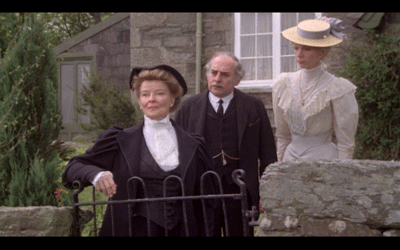
Jamie S. Rich is a novelist and comic book writer. He is best known for his collaborations with Joelle Jones, including the hardboiled crime comic book You Have Killed Me, the challenging romance 12 Reasons Why I Love Her, and the 2007 prose novel Have You Seen the Horizon Lately?, for which Jones did the cover. All three were published by Oni Press. His most recent projects include the futuristic romance A Boy and a Girl with Natalie Nourigat; Archer Coe and the Thousand Natural Shocks, a loopy crime tale drawn by Dan Christensen; and the horror miniseries Madame Frankenstein, a collaboration with Megan Levens. Follow Rich's blog at Confessions123.com.
|
| Popular Reviews |
| Sponsored Links |
|
|
| Sponsored Links |
|
|
| Release List | Reviews | Shop | Newsletter | Forum | DVD Giveaways | Blu-Ray | Advertise |
|
Copyright 2024 DVDTalk.com All Rights Reserved. Legal Info, Privacy Policy, Terms of Use,
Manage Preferences,
Your Privacy Choices | |||||||














